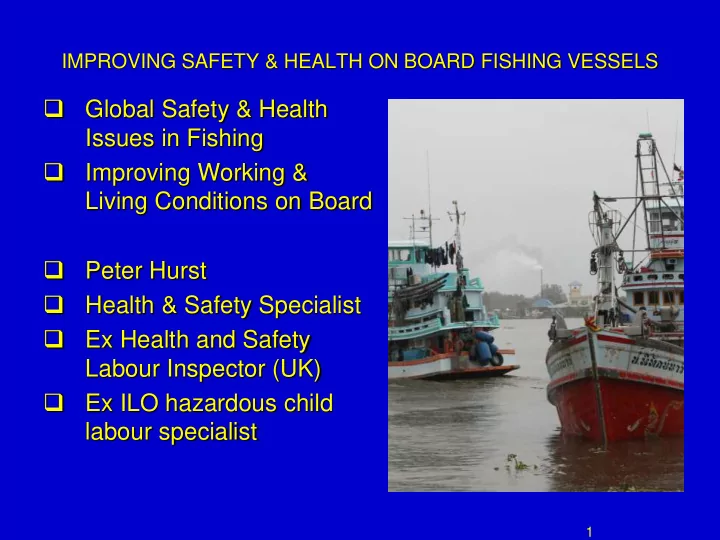

IMPROVING SAFETY & HEALTH ON BOARD FISHING VESSELS Global Safety & Health Issues in Fishing Improving Working & Living Conditions on Board Peter Hurst Health & Safety Specialist Ex Health and Safety Labour Inspector (UK) Ex ILO hazardous child labour specialist 1
IMPROVING SAFETY & HEALTH ON BOARD FISHING VESSELS Health & safety problems in fishing on board vessels Workplace – fishing vessel Health & safety is about finding SOLUTIONS – improving RISK MANAGEMENT Saving lives & limbs Preventing injuries/illness Health promotion – diet Safety & health in rural, agricultural communities Food security 2
GLOBAL SAFETY & HEALTH ISSUES IN FISHING Commercial fishing vessels Smaller artisanal fishing vessels Migrant labour Child labour Women involved in fish processing Vulnerable groups Asian Regional Seminar on Work in FIshing Convention 3
Global Safety and Health Issues in Fishing Globally, sea fishing is one of the FOUR most dangerous occupations Canada, USA – fatal accident rates are not falling UK fishers: 1 in 20 chance of being killed on the job during the course of their working lives “All body parts ache” – Indonesian fisher 4
SAFETY & HEALTH ON BOARD FISHING VESSELS ILO C 188, Article 31. Governments: adopt laws, regulations, other measures on Occupational Safety and Health (OSH) duties of owners, skippers, fishers training accident reporting joint OSH committees 5
SAFETY& HEALTH ON BOARD Article 32: Duties of vessel owners Establish on board safety & health procedures Guidance, training material, information Risk evaluation/assessme nt Safety training for crew 6
EXTERNAL FACTORS Bad weather – rough seas, fog etc. Extreme temperatures Exposure to sun Weather forecasting Other vessels - collisions 7
DROWNING MAIN cause of fatalities in fishing worldwide Falling into the water Being swept overboard Vessel sinking or capsizing Lack of safety equipment – no safety line in this photo 8
DROWNING Swimming and diving Lack of emergency rescue procedures 9
PHYSICAL, HEAVY, STRENUOUS WORK Heavy & awkward loads – handling nets, unloading fish etc. Deck in constant motion, wet, slippery Musculoskeletal injuries to muscles, joints, tendons, nerves, bones Risk of permanent injury 10
SLIPS, TRIPS & FALLS Crowded decks – ropes, cables, nets Decks wet, slippery, constant motion Lighting & visibility Falls into open fish holds, from ladders, from masts, gantries 11
MACHINERY SAFETY Machinery Safety Winches, hoists etc. No guards No emergency stop buttons Operator should guide the rope with stick not with his hand 12
ACCOMMODATION, FOOD & WATER Accommodation is critical but often poor Cramped conditions Overseas trawlers at sea for long periods Lack of clean drinking water, washing facilities, and toilets Contagious disease risks Lack of facilities for food preparation, food storage 13
LIGHTING & VISIBILTY Internal lighting for fishing work is often not adequate Increased risk of accidents Purse seine boats fish at night 14
HOURS OF REST & FATIGUE Fatigue (extreme tiredness) - ill health, increased accident risk Skippers determine hours of work. Taking into account fatigue etc. Minimum hours of rest for 3 days+ at sea = 10 hours in any 24 hours 77 hours in any 7 days Article 14 15
FIRST AID & MEDICAL CARE At least one fisher on board who is trained in first aid, C 188, Art 29 Fishing vessels should carry appropriate medical equipment and supplies With guidance and instructions in languages used on fishing vessels Medical advice via radio or satellite transmissions 16
DISEASES Skin diseases Between knife cuts and crushed fingers, skin infections are almost inevitable Occupational asthma fro breathing in fish protein from fish and shellfish. Fish processing – women & child workers Communicable diseases – e.g. tuberculosis 17
SAFETY EQUIPMENT Fishing vessels often have no safety equipment or it is poor C 188 - Every fisher on board is provided with appropriate personal protective clothing and equipment C188, Article 32 18
Minimum Age – (Hazardous) Child Labour ILO C 188, Article 9 16 years (A.9(1)) Some exceptions to allow children of 15 to work Adolescents Growth and development – physical, biological, mental and emotional Bodies, minds and personalities developing Factor in psychosocial risks – stress, violence etc. 19
WORKPLACE RISK EVALUATION / ASSESSMENT Risk Assessment & Management, combined with training, and on board instruction Employers – vessel owners and skippers Are responsible for carrying out the workplace risk assessment and implementing any health and safety improvements identified in it 20
RISK ASSESSMENT How to involve the CREW who may be Migrant workers – different languages Workers know the dangers; have ideas on how to put things right, involved in making the health and safety improvements On shore, joint health and safety committees 21
INSPECTIONS OF WORKING & LIVING CONDITIONS ON BOARD Often a “grey area” (C 188, Article 42). Government function Overlapping jurisdictions – labour inspectorates, maritime, fishing, navy Few “inspections” carried out on board vessels Certificate of inspection of working & living conditions – + 24 metres,+ 200km, + 3 days. C 188, Article 41 22
FISHING ASSOCIATIONS/ORGANISATIONS Key role in improving working & living conditions on board Vessel owners & skippers - how to help them make health and safety improvements? How to strengthen cooperation/ coordination between fishing employers and their organisations in the ASEAN region? 23
WORKERS ORGANISATIONS IN FISHING How to strengthen the role of trade unions in improving working and living conditions on board? ITF/IUF – global trade union federations From Catcher to Counter Global programme to organise workers in the fishing industry ASEAN region? 24
IMPROVING WORKING & LIVING CONDITIONS SAFETY & HEALTH FIRST Slogan on a deep sea trawler, Sirichai Reefer Aim is that all boats in the ASEAN fishing fleets will be able to carry a new slogan SAFETY & HEALTH FIRST for the FISHERS who provide our food 25
Recommend
More recommend